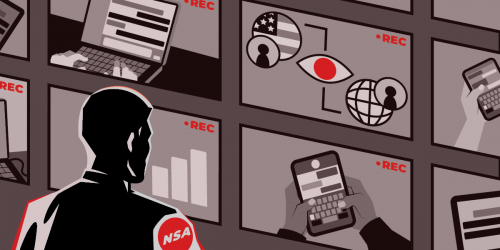ANDREA MITCHELL: “Why do you need every telephone number? Why is it such a broad vacuum cleaner approach?”
JAMES CLAPPER: “Well, you have to start someplace.”—NBC Meet the Press, this past Sunday
Concerned about the surveillance of millions of ordinary Americans, last year Senator Ron Wyden asked Director of National Intelligence James Clapper, Jr. a simple question: "Does the NSA collect any type of data at all on millions or hundreds of millions of Americans?"
Wyden had good reason to worry. As a member of the intelligence committee he had access to classified information and had been warning from the Senate floor that the American people would be “shocked” to find out how the government was interpreting the FISA Amendments Act and the PATRIOT Act in secret.
DNI Clapper’s answer was simple: "No, sir ... not wittingly."
 This just is not true. We’ve known for years that the government has been conducting surveillance on millions of ordinary Americans, and now we know that the Foreign Intelligence Surveillance Court issued an order in April requiring Verizon to hand over *all* call records, foreign or domestic, of every call of every customer to the NSA. Simply put, DNI Clapper’s statement was not the truth.
This just is not true. We’ve known for years that the government has been conducting surveillance on millions of ordinary Americans, and now we know that the Foreign Intelligence Surveillance Court issued an order in April requiring Verizon to hand over *all* call records, foreign or domestic, of every call of every customer to the NSA. Simply put, DNI Clapper’s statement was not the truth.
On Sunday’s Meet the Press, Clapper was grilled about his statement to Congress. He claimed it was the “least untruthful manner by saying no.”
How does he defend that? This may sound strange, but the Administration actually uses very particular definitions of words that are vastly different from how ordinary people interpret them and how they're normally defined. As we explained in this dedicated page to the NSA’s word games, “collect” has a very different meaning to them than it does the rest of us.
Under Department of Defense regulations, information is considered to be “collected” only after it has been “received for use by an employee of a DoD intelligence component,” and “data acquired by electronic means is ‘collected’ only when it has been processed into intelligible form.”
In other words, the NSA can intercept and store communications in its database, then have an algorithm search them for key words and analyze the metadata without ever considering the communications “collected.”
Here's how Clapper explained it:
JAMES CLAPPER: And this has to do with of course somewhat of a semantic, perhaps some would say too-- too cute by half. But it is-- there are honest differences on the semantics of what-- when someone says "collection" to me, that has a specific meaning, which may have a different meaning to him.
“Too cute by half”? Clapper’s answers certainly was not a slip of the tongue. Today, Wyden said in a statement that he gave Clapper a day’s notice that he was going to ask the question, so as not to catch Clapper off guard. Wyden also gave Clapper a chance to amend his answer after his testimony, but Clapper declined.
In bizarre analogy, Clapper compared the NSA’s vast database with a library:
A metaphor I think might be helpful for people to understand this is to think of a huge library with literally millions of volumes of books in it, an electronic library. Seventy percent of those books are on bookcases in the United States, meaning that the bulk of the of the world's infrastructure, communications infrastructure is in the United States.
So in the DNI’s world, “collection of U.S. persons' data would mean taking the book off the shelf and opening it up and reading.”
Of course, in the real world, when you add books to a library, that’s when they become part of the collection. Even if the librarian hasn't read all, or even most of them. Imagine Clapper has a built a home library, and friend comes over. "That's quite a collection of books," the friend says. "No, no, that's not a collection of books – I haven't read them all."
Ironically, the one check on Section 215 of the PATRIOT Act that was added by Congress is restrictions on how the FBI can target libraries.
All of this would be amusing if the Administration’s main argument to defend the NSA’s massive spying program is that Congress has been informed of all their activities. Democracy can’t function when Congress is “informed” by the “least untruthful” statements of the Administration, using unusual definitions that are designed to given an impression that is the polar opposite of the truth.
Lots of words can have multiple definitions – “to fire” can mean to discharge a firearm or to glaze pottery in a kiln. But if you’re asked if you fired a gun, they’re not asking if you put it in a kiln. Senator Wyden was clearly asking if the NSA obtained the records, not whether they looked at each and every one, and DNI Clapper is too smart to have misunderstood him.
It’s clear Congress has been deceived and DNI Clapper and the Administration should come clean on how, when, and why they scoop up the phone and Internet records of millions of Americans. Join EFF in calling for a full investigation by emailing Congress today.







